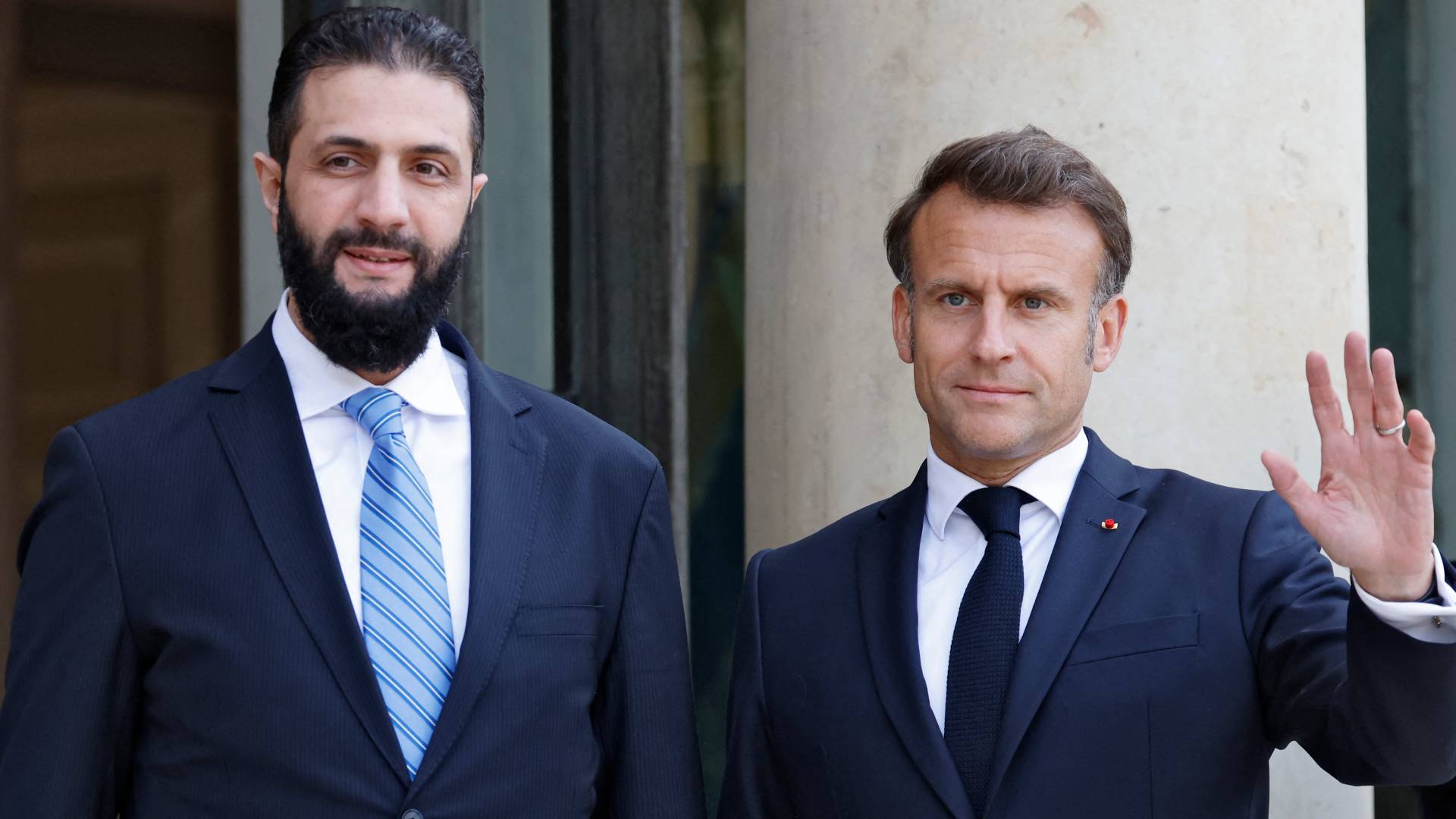France's Emmanuel Macron welcomes Syrian interim President Ahmed al-Sharaa upon his arrival at the Elysee presidential palace.
Syria's Sharaa confirms indirect talks with “Israel”
French President Emmanuel Macron on Thursday condemned “Israeli” strikes against Syria, saying the attacks will not guarantee "Israel's long-term security."
"As for bombings and incursions, I think it's bad practice. You don't ensure your country's security by violating the territorial integrity of your neighbours," Macron said during a joint press conference with Syrian President Ahmed al-Sharaa in Paris.
Al-Sharaa confirmed that Syria was holding "indirect talks" with “Israel” to calm tensions between the two countries, following hundreds of “Israeli” strikes on Syria since Bashar al-Assad's ouster.
"Regarding indirect talks with Israel, there are indirect talks taking place through mediators to calm the situation and try to contain the situation so it does not reach the point where it escapes the control of both sides," Sharaa said.
Macron meanwhile called for a continuation of "the gradual lifting of European economic sanctions" if the new Islamist authorities stabilise the country.
Sharaa said there was no justification for maintaining European sanctions on Syria.
Al-Sharaa on Wednesday met French leader Emmanuel Macron on his first visit to Europe since overthrowing longtime ruler Bashar al-Assad, despite alarm over deadly clashes that have overshadowed the new authorities' first months in power.
Ahead of the high-profile talks at the Elysee Palace, Sharaa and his foreign minister met a whistleblower who helped document horrific torture under long-time ruler Bashar al-Assad.
Sharaa and Assaad al-Shibani "met with Farid al-Madhan, known as “Caesar", the Syrian presidency said.
Sharaa and other top Syrian officials are under pressure from Europe to show they are serious about protecting human rights as Damascus seeks the full lifting of Assad-era sanctions after 14 years of devastating war.
Madhan revealed his identity in February during an interview with broadcaster Al Jazeera. He fled Syria in 2013 with some 55,000 graphic images including photographs showing emaciated bodies and people with their eyes gouged out.
The photographs inspired a 2020 US law which imposed economic sanctions on Syria and judicial proceedings in Europe against Assad's entourage.
In Paris with Macron, Sharaa will discuss post-war reconstruction and economic cooperation, a Syrian government official said.
"This meeting is part of France's historic commitment to the Syrian people who aspire to peace and democracy," the Elysee Palace said.
By welcoming Sharaa, Macron hopes to help the authorities on the way to "a free, stable, sovereign Syria that respects all components of Syrian society", a French presidential official told AFP.
The official said France was aware of "the past" of certain Syrian leaders and was demanding that there be "no complacency" with "terrorist movements" operating in Syria.
“Fight against impunity”
"If we are inviting him (Sharaa) here, it is precisely to ask him to go further in the fight against impunity," Foreign Minister Jean-Noel Barrot told broadcaster TF1.
Sharaa headed the group Hayat Tahrir al-Sham (HTS) which spearheaded Assad's downfall after 14 years of civil war.
He is still subject to a UN travel ban and France most likely had to request an exemption from the United Nations, as was the case for his recent trips to Turkey and Saudi Arabia, according to a source familiar with the matter.
France, a former colonial-era ruler of Syria, is eyeing an opportunity to increase its influence in the country after years of Russian presence, with French companies also seeking contracts.
Last week, French logistics giant CMA CGM signed a 30-year contract to develop and operate the port of Latakia.
Mehad, a French NGO which has operated in Syria since 2011, warned of a worsening humanitarian crisis in the country and called for "a strong response" from France.
"Emmanuel Macron's strong commitment must now be translated into action, not only by maintaining the budget allocated to humanitarian aid in Syria, but also by disbursing it quickly," said Mehad director Mego Terzian.




